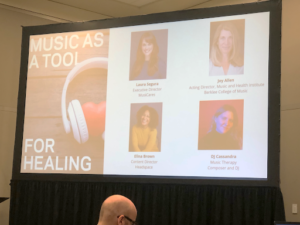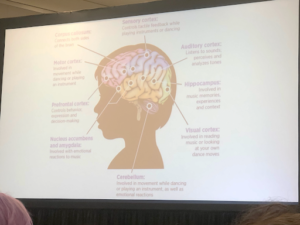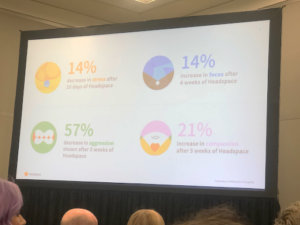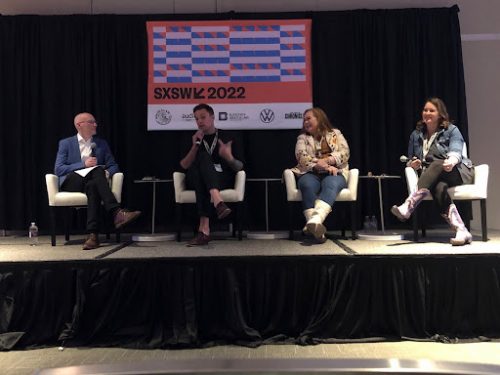As a person working in the music business and someone who suffers from health issues, the topic of mental and physical health in the music business is quite important to me. During SXSW I attended several panels on the “Future of Live Music” track, two of which were specifically dedicated to improving our mental health options as musicians and industry professionals.
On the Monday of the conference, I sat in on the “Music as a Tool for Healing” panel, featuring Laura Segura (executive director of Musicares), Elina Brown (content director at Headspace), Joy Allen (chair of the Berklee College of Music), and Cassie Shankman A.K.A. DJ Cassandra (DJ and composer).

“Music has been used for medicinal purposes from the beginning of time,” said Allen. “All of us respond physiologically to music.”
She has recently been a part of creating and opening the Music and Health Institute at Berklee, a database of resources for the study of music as medicine. The college also created a new minor for music in health.
“The actual act of singing is actually activating,” said Allen. Even things like singing in the shower or the car can go far in terms of turning on various functions in our brains, but not all music is inherently good for your health. “Too high of a frequency can have detrimental effects. Too low of a frequency can also have detrimental effects.”

Cassie Shankman, A.K.A. DJ Cassandra, is not only a working musician here in Austin but a critical piece of the Biomedical Music Solutions puzzle. Biomedical Music Solutions creates custom pieces to aid people primarily suffering from loss of mobility to regain their ability to walk by activating different parts of the brain.
“It’s pretty amazing how powerful music is,” she said, explaining how Biomedical Music Solutions creates their various pieces. She also explained that hospitals are beginning to use music in the NICU (something I definitely could’ve benefited from during my stay as a newborn) and even how former Rep. Gabby Giffords utilized the technology in her recovery.

Headspace’s Elina Brown isn’t a music professional, but a mental health specialist. Headspace is an app that I personally love and use regularly, although not necessarily for music. They recently named John Legend their Chief Music Officer and work collaboratively with him and their scientists to create effective musical content.
“People are looking for relief in the moment,” says Brown, noting that sometimes people don’t have time for a long session or don’t want specialized content. Headspace, she explains, begins with short-form content that eventually leads into longer meditations, in order to “meet people where they are.”
Something you may or may not be surprised to hear: TikTok has been an important tool for mental health during the pandemic. “TikTok was very healing during the pandemic,” said Shankman. “TikTok created a whole wellness sector.”
On the Tuesday of the conference, I attended a panel called, “Why Mental Health for Musicians Matters,” moderated by James Ainscough, Chief Executive at Help Musicians. The panel also featured Niall Breslin, mindfulness expert and musician (and retired rugby player) and Reenie Collins and Rachel Hanss Blair from Health Alliance for Austin Musicians (HAAM).
The first question they wanted to answer was this: Do musicians struggle with their mental health because they need to be a tortured artist to create great art? The answer was a resounding No. In fact, Ainscough said, “Most will say their ability to create is hampered by their mental health issues, not helped by them.”
*
Rachel Hanss Blair stated that the life expectancy of (US) musicians is 25 years less than the general population. TWENTY-FIVE YEARS! Why is that? Well according to Breslin, it’s because, as a musician, “You’re not at the table, you’re on the menu.” People treat musicians like a commodity and use them for their craft, not with the kindness and decency they deserve as human beings.
“The first thing you need is a good manager who protects you and takes care of you,” suggests Breslin.
But if you ask the ladies from HAAM, it can be difficult getting musicians to understand the care they deserve and need to receive. “I have to really encourage people to apply and receive our services,” says Blair. She stresses the importance of having current clients spread the word to their friends because “musicians have an incredible ability to influence each other’s behavior.” As Breslin put it: “Don’t wait to be saved, there are brilliant people that will help you.”
Blair also harks back to scientific data that was referenced in the first panel: “One of the best ways to regulate your nervous system is through music.”
Of HAAM, Collins says they “believe that mental health and physical health go together.” Along that line, Ainscough highlights the need for a healthy rider. He says you don’t have to go out of your way to put complicated, convoluted items or accommodations in there. Just try asking for water instead of beer, fruits and veggies instead of processed snacks, and other simple choices. Maybe ask for a quiet room to relax in before or after the show.
Breslin provided 5 tips that musicians (and anyone in the music industry) can do every day to improve their mental health:
- Limit exposure to toxic environments. Toxic environments are intoxicating to us.
- In that little hazy moment before you fall asleep, say one good thing about yourself, one life-affirming thing. Be your own cheerleader.
- When you wake up, keep your eyes shut and think of 5 things you’re thankful for (put your energy into the things you have in life, not the things you don’t have).
- Have 10 mindful moments a day. This doesn’t have to be anything major. Just take a moment to smell your coffee or feel your feet on the ground.
- Stop judging people… and yourself.
Ultimately, both panels stressed the importance of therapy and mental health care. Unfortunately, this can be cost-prohibitive for many people. If you are a musician in Austin, HAAM and SIMS can offer more information on how you can access these services.
Article and photos by Stephanie Robinson, A.K.A. Stefny! At the Disco
